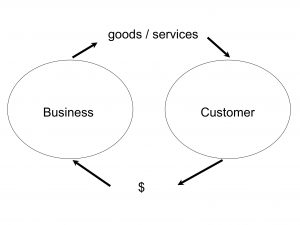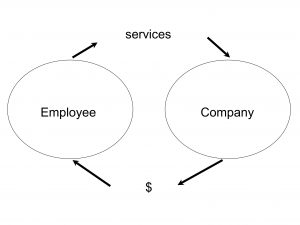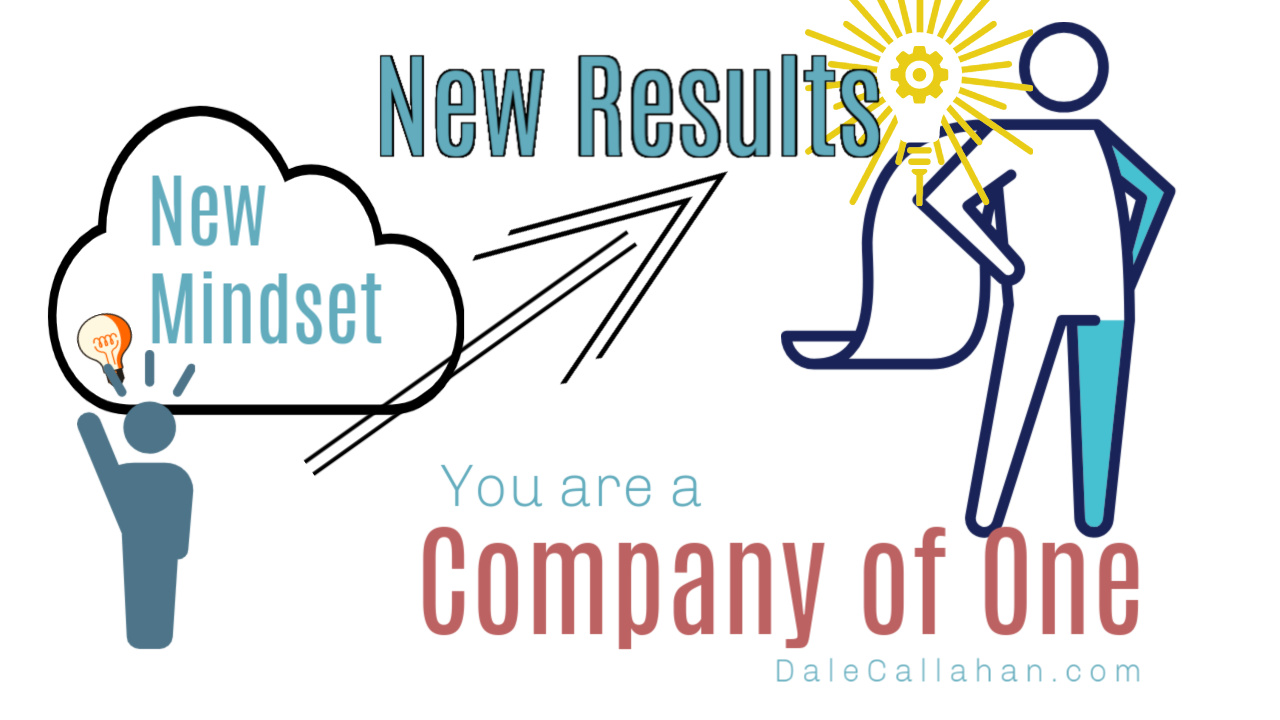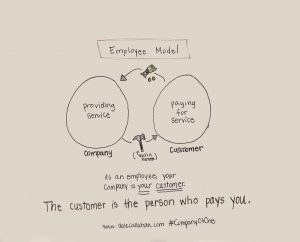Ready to grow your own company of one.
Since the title of this podcast is Company of One, many of you are asking lately, “What do I mean by the “company of one?”
So today, I want to help you understand this concept and grow your own Company of One.
Why?
- It will help you see some of the misconceptions about the work we have been taught.
- It will bring your freedom.
- It will help you make more money.
Grow Your Own Company of One
To explain the company of one, we will look at a company we all know.
The Business Model
Let me us Walmart to help depict this model. We all know of Walmart. But have you ever thought about the critical thing that happens in Wallmart? In fact, the only thing Walmart focuses on. It happens as a relationship. When you hand over money in return for goods/services. This exchange of money for goods and services is what we call doing business.
This model is typically called the business model. In this model, the person who hands over the cash is the customer, and the one that takes the money and provides a good or service is the business or company.
We are all very familiar with this model – especially from the customer side.

The Business Model
The Employee Model
Now let’s looks at a model we are also very familiar with. I will call this the employee model. In this model, you go to work for an employer. You are called the employee. Let’s assume you work as a project manager for AT&T. So you go to work and provide a service managing multiple projects. I will assume that means you help them get work done on-time and on budget while not missing anything critical.

The Employee Model
Now even the untrained eye can see that these two models are pretty much the same thing. They are identical except for one feature.
Notice who hands over the money now. In my example, it is the company or AT&T. And the employee provides the service. So, since AT&T hands over cash, they are the customer. That makes the employee the company or the business.
A good depiction of that is below, as drawn by my daughter Cassidy Cash – also known as Cassidy Cash, host of That Shakespeare Life.
We are all a Company of One
The point is that the employee model is a lie. We are not employees; we are small one-person companies providing a service to larger companies. We are all companies.
Now you might get that immediately, but I know some of us need to process this. It is very critical that you understand.
Why?
If you understand this, you will have more power, more freedom, and can learn to make more money. Sound like a bold promise? It is. But yet, it is the truth.
You see, most of us play one of three roles. First is the victim. Second is the rule follower. The third is the entrepreneur. It is the third role that gets the spark. Entrepreneurs are not just the ones starting companies; they are the ones making things happen even inside of the big companies while they operate as an “employee.”
It is the entrepreneur who will have the most impact and the most joy. They are the ones who operate like a company of one.
Four Key Roles of any Company
To see what I am getting at, let’s analyze how a company works. It as Earl Nightingale, who I first heard describe the four key roles of a company. They are operations, marketing, finance, and research.
When I started teaching entrepreneurship at UAB, I used this simple model of a company to communicate ideas to those who were used to working in large companies like AT&T, Wells Fargo, Lockheed, Boeing, Mercedes, IBM, and many other companies. These students of mine were very smart, but the businesses they worked for were so complex that they had a hard time moving their thinking from big business to a simple model. So Earl’s model worked well.
As I broke this down for them, I would explain to them how they were this Company of One and that they all had these roles in their own company.
Let’s give them standard labels.
1. Operations – This role is usually headed up by the Chief Operations Officer or Cheif Operating Officer – or COO. Operation is how you serve the customer. This is the role of providing goods and services.
2. Marketing – The Cheif Marketing Officer or CMO heads this role. This role is about educating the customer on how you can serve them and how you have served them.
3. Finance – The Chief Financial Officer or CFO directs this role. This role takes care of the money and the bills as well as other reporting functions. Most customers do not see this part.
4. Research – This role is usually a mix of multiple functions, but for simplicity, we will call it the Chief Research Officer or CRO. This role is looking around for innovations to make things better, the competition which will take business away, and changes in society, technology, and the markets that will either impact current products and services or provide new opportunities.
And of course, the COO, CRO, CMO, and CFO report to the Chief Executive Officer or the CEO.
That is how companies operate.
Now look in the mirror. You are seeing your COO, CMO, CFO, CRO, and CEO looking back at you.
STOP!!!
Wait for that to sink in. You are 100% responsible for the following.
Operating – or doing your job with competence and to the satisfaction of your customer (your boss). This is the most prominent role, but most of us are missing a lot here.
Marketing – educating your customer (boss) on what you can do and what you have done. Most of us fail terribly in the CMO role.
I am going to skip the other two for now (too much to talk about) because the first two roles are filled with risk and opportunity. If you can just get your head around these two, you will make more money and feel better about your work.
Yes – that is a promise.
The Company of One Model
This is the model. Getting your head around it and making it work for you can take some time. This is not about learning the Company or One Model – it is about unlearning the lie of the employee model.
In the podcast today, I explain in more detail the model and the essential ideas.
From here, we will build it into something more.
Subscribe & Review in iTunes
Are you subscribed to my Company of One? If you’re not, I encourage you to do that today, so you don’t miss an episode. Click here to subscribe in iTunes!
If you like what you hear, I would be really grateful if you left me a review over on iTunes, too. Those reviews help other people find my podcast. I also love reading them and connecting with you. Just click here to review, select “Ratings and Reviews” and “Write a Review” and let me know what your favorite part of the podcast is. Thank you!







0 Comments